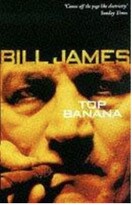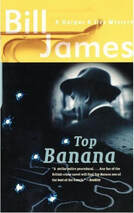
Through this murk, local kingpin Mansell Shale sees an opportunity to reach a sort of symbiotic relationship with the police, mainly by offering to stop the street feuds and maintain peace if law enforcement looks the other way on – and essentially protects – his drug business. For a moment, the pragmatic Iles considers such a pact with the enemy (as morality and even law are flexible concepts anyway, able to be shaped to meet the needs of the moment) while Mark Lane refuses to capitulate. Instead, the nervous but proud Chief Constable wants an officer to go deep undercover and infiltrate Shale’s business; it’s a plan that sickens and infuriates Iles, who feels the foolhardy step would only produce another dead copper. It doesn’t help that Lane’s top pick for the scheme, an enterprising drug-squad officer named W.P. Jantice, is rumored to be working both sides himself.
The usual joys of Bill James’s work are to be found here. Top Banana is a twisty but true-ringing crime story populated by ambitious, quirky characters familiar and new. Stalwart Jack Lamb, Harpur’s valuable informant, is once more in the mix, but this time makes a painful miscalculation when he tries to protect his own resource in Harpur. Shale’s own confidante, a calculatedly positive bloke named Alf Ivis, shows the author’s delightful skill at sketching an adept survivor circulating among the criminal classes: Alfie may be Manse Shale’s sympathizer and sounding board, but he knows perfectly how to modulate his words for maximum effect.
As in other stories, Harpur’s teen daughters manage to contend with their father’s criminal contacts (who occasionally show up at the house) by offering a fascinating mix of curiosity and sangfroid sarcasm. Meanwhile, Keith Vine and Stan Stansfield, two up-and-coming drug entrepreneurs whose hubristic characters are memorably explored in The Detective Is Dead (1995), remain on the periphery; James’s narrative promises that they will return to the center stage once more, vying for that powerful top spot in a dangerous trade where violent death is a vocational hazard.
Bill James’s darkly bruised humor appears throughout this Banana, surfacing even in the more prosaic moments, as with Colin Harpur’s observations on his boss’s flair for fashion:
The ACC looked ungenial in one of his superb single-breasted grey suits and a murkishly striped tie that would be some mighty London club’s: the kind of what-the-fuck-are-you-staring-at tie meant to cow the masses by tastelessness. He was still doing his hair en brosse following a late-night season of Jean Gabin films at one of the cinemas. He gave Harpur a kind of smile, an Iles kind, fat with insult.

 RSS Feed
RSS Feed